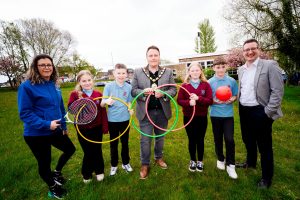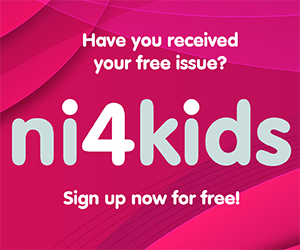Ni4kids’ Laura Barr spoke with Policy and Public Affairs Manager, Fergal McFerran from the Children’s Law Centre for our new monthly feature, The Big Interview Q&A.
Today (Thursday 18 May), a team of young people from Northern Ireland questioned members of the UK government and devolved regions at the United Nations in Geneva on how the latest budget cuts will impact on them.
With representatives from the Children’s Law centre (CLC) NI, the group of young people raised concerns with international experts who sit on the Committee on the Rights of the Child to inform questions Committee members then put directly to UK officials.
Fergal, can you explain to our readers, how the latest budget cuts will affect children here in NI?
“The impact of the cuts will be felt across all communities in Northern Ireland, but they will disproportionately adversely impact the most vulnerable children and young people. Interventions such as the School Holiday Food Grant, Healthy Happy Minds and the Extended Schools programme have been crucial in mitigating the growing and increasingly complex level of need that exists and in addressing growing inequality.
“We also know that there are many other examples of programmes, funds and projects being cut or ended that provided targeted support to specific groups of young people and their families, these are a lifeline for many. We have no doubt that the cuts will perpetuate cycles of disadvantage and stockpile more complex needs that will need to be addressed at a later date, at greater financial and personal cost.”
How did the letter to the Secretary of State for NI come about?
“CLC have been working to collect views from children and organisations across Northern Ireland to inform the UK examination by the UN Committee on the Rights of the Child. We had identified serious concerns and were already working to highlight them. When the cuts to services began filtering through, we realised very quickly that many of the services earmarked for cuts or closure were impacting the very vulnerable groups we had already been working to protect.
“Early intervention programmes aimed at tackling mental health problems in children and young people, or special educational needs and disability transformation budgets, for example. When the Secretary of State for NI then announced his budget, we believe the decision was made with little to no regard for the impact it would have on these groups and others. We quickly got together to discuss how we could reach out to the network of organisations we had already been working with to raise of collective voice and concern.”
What does the Children’s Law Centre hope to achieve with the letter?
“We hope to bring attention to the growing problems facing children and young people and demonstrate how decisions being made are adversely impacting them. We want the government to be fully aware that we will hold them to account on their equality and human rights obligations to assess the impact and mitigate against the negative effects of the decisions they take or reverse the decisions completely if needed.”
This week is Mental Health Awareness Week, do you feel more needs to be done here in NI to support our young people and children with mental health?
“Young people are facing a mental health crisis. They face long waits, especially for specialist services if they have disabilities or are LGBTQ+. They also face constantly rescheduled or cancelled appointments, not having enough time to talk, and not being taken seriously. These are all issues raised directly with us by children and young people.
“We’re also worried about growing trends we’ve seen through our advice line since Covid, around anxiety and school absences. The Northern Ireland Executive needs to end the long-standing, chronic under-investment in CAMHS.”

Can you tell us about some of the issues the Children’s Law Centre raised in Geneva?
“We’re very concerned about the current situation for children and young people. The reports we submitted to the Committee were informed by a wide range of expertise within the NGO sector in Northern Ireland. They also gave a voice to over one thousand children and young people here. We were able to give an authoritative indication of where we are in relation to children’s rights and the issues facing children, but I’m afraid it was very concerning reading.
“A number of the major recommendations from previous concluding observations from the UN Committee remain unimplemented. These include raising the age of criminal responsibility, removing the defence of reasonable punishment, the failure to enact a Bill of Rights for Northern Ireland, and the introduction of age discrimination legislation to protect children. These are all issues raised in 2016 which have still not been addressed.
“The subsequent years have become even more perilous for children and young people. Since 2016 we’ve had attacks on human rights from the UK Government, uncertainty around rights protected by the Good Friday Agreement, escalating pressures on public services, the impact of Covid policies on vulnerable children, and a growing failure to protect newcomer children.
“The situation has now become even worse, with the budget announced by the Secretary of State for Northern Ireland, Chris Heaton-Harris, set to cause active harm to children and young people.”
What does the Children’s Law Centre hope to achieve through discussions with the UN Committee on the Rights of the Child?
“We hope to secure a strong set of recommendations from the UN Committee on the Rights of the Child highlighting the areas we have identified throughout the reporting process. We will then work to hold the UK Government and any NI Executive to account to ensure swift implementation of the recommendations.
“The Children’s Law Centre was founded on the principles of the UN Convention on the Rights of the Child so ultimately, we believe that children’s rights change children’s lives. That’s our ultimate goal – to improve the lives of children and young people in Northern Ireland by protecting, strengthening and enhancing children’s rights.”
The Children’s Law Centre provides a free child friendly legal advice and information service, which deals with over 2000 issues annually. The service provides free advice by phone or email to children and young people, their parents/carers and professionals with legal queries relating to difficulties in school, access to services for disabled children, special educational needs, mental health service provision, homelessness, family law issues and other general legal queries. They also provide a digital information and advice service for young people aged 13 – 17, called REE Rights Responder and REE Live Chat, which can be found at www.reerights.com





